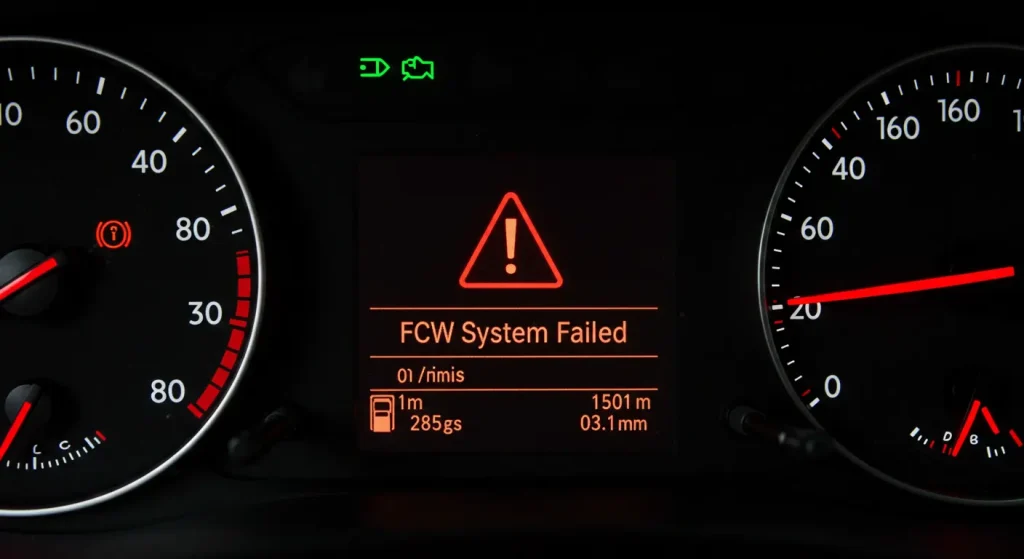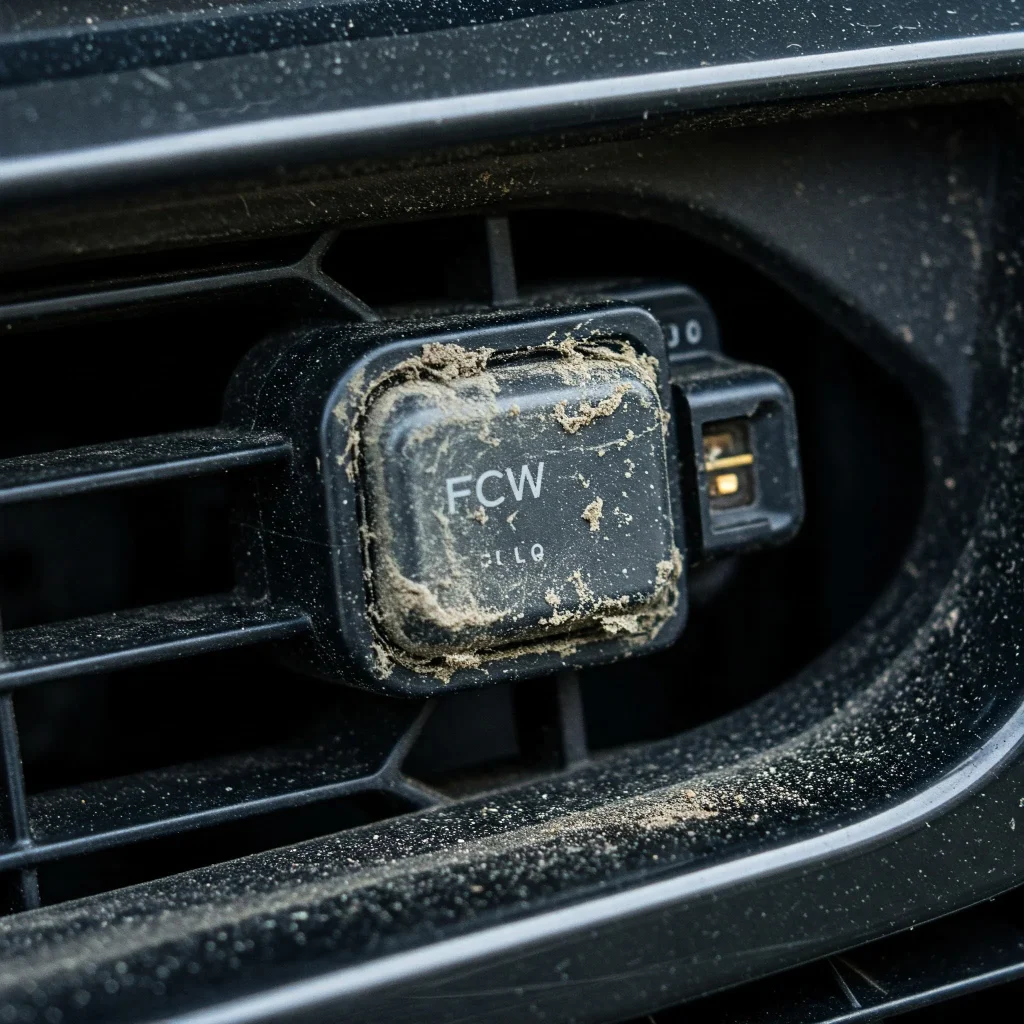Is Your FCW System Failed? Here’s How to Fix It!
The FCW System Failed alert shows a problem with your car’s Forward Collision alert (FCW) system. This system detects obstacles and alerts the driver to prevent accidents.
When this warning shows, the system will not function properly—risking the danger of a collision. This problem is found to be common in Honda cars. So, we are here to tell you what to do if your FCW system failed Honda Accord.

What Is the FCW System?
The Forward Collision Warning system is a safety element in modern cars that helps to prevent accidents. It detects obstacles in the car’s route using sensors and radar. If the system detects a probable collision, it will notify the driver through visual or haptic warnings such as steering wheel or seat vibrations.
The FCW system does not use the brakes automatically but allows the driver adequate response time. This makes driving safer and lowers the chances of an accident.
What Does “FCW System Failed” Mean?
The “FCW System Failed” notice shows that the Forward Collision Warning (FCW) system is malfunctioning. This could be due to a fault with the system’s sensors, cameras, software, or electrical components.
When this notice appears, the FCW system will not accurately detect obstructions, which increases the risk of an accident. If this warning appears, the driver should look for any visible problems or seek expert assistance if the problem persists.
Causes of FCW System Failed Honda Odyssey
If your Honda Odyssey displays the “FCW System Failed” warning, the Forward Collision Warning (FCW) system is not working properly. Here are the most usual causes of this:
Dirty or Obstructed Sensors and Cameras
The FCW system of the Honda Odyssey uses front-facing cameras and sensors to identify obstacles. If the sensors are obstructed by dirt or debris, they will not function correctly which shows the “FCW System Failed” message. Cleaning the front grille sensors and windshield cameras can resolve the system functionality.
Sensors or Camera Failure
With time, FCW system’s sensors and cameras wear out over time. Incidental physical impact from minor mishaps or rainwater can degrade them. This damages the ability of the sensors to detect obstacles appropriately. Cleaning can not solve it, so improper sensors need replacement to get optimal system performance.
Software or Firmware Glitches
The FCW system is controlled by vehicle software, and occasionally, software glitches or old firmware can cause malfunctioning. If the system starts giving false alarms or ceases to function, it could be due to a software problem. The FCW system software can usually be repaired by updating it at a Honda dealership or an authorized service center.
Electrical or Wiring Issues
The FCW system is dependent on electrical wires to link sensors, cameras, and the vehicle’s master control unit. If wires become loose or corroded, the system will not receive signals correctly, causing an error message. A mechanic can check the wires and correct any connectivity issues to restore normal operation.
Severe Weather Conditions
Heavy rain or snow can damage the FCW system’s ability to detect objects properly. On extremely cold days, the sensors freeze up or get coated with ice, which causes the system to fail or issue false warnings—waiting until weather improves or parking in a garage can help if the failure is due to weather-related conditions.
Low Battery Voltage or Weak Battery
The FCW system uses a solid power supply from the vehicle’s battery to operate effectively. When the battery is weak or in the process of failing, the system will not get sufficient power to work, and an error message will be displayed. Checking the health of the battery and replacing a weak or old battery can sometimes resolve the problem and avoid FCW failure.
Also Read: Transmission Fault Service Now
How to Fix the FCW System Failed Issue?
Here is how to resolve the FCW system failed Honda Accord or any other car:
Check and Clean the FCW Sensor
The FCW system uses sensors to scan objects in front of it and dirt or debris can clog them. First, refer to your owner’s guide to find the sensor which is usually behind the Honda logo or on the windshield.
Check for debris, cracks, or blockages. Clean the area with a soft cloth and a suggested cleaning agent. If you see loose or rusted connections, reattach or replace them.
Check Wiring and Electrical Connections
Faulty or loose wiring can also cause the FCW system to malfunction, damaging the communication between the sensors and the vehicle’s ECU. Open the hood and check the wires around the headlights and front grille for damage.
If you notice loose or frayed wires, tighten or replace them accordingly. Once you have repaired the connections, restart the vehicle and check if the FCW system warning has disappeared. If the problem continues, a more thorough electrical check will be required.
Reset or Replace the FCW System Module
If cleaning the sensors and checking the wiring does not solve the problem, the FCW control module will require a reset or replacement. A Honda dealership-certified technician can scan the system for fault codes and identify whether a module replacement is needed.
Once the module has been replaced, they will clear fault codes and reset the system. To confirm all is well, take the vehicle for a test drive and see if the FCW system works as expected.
Also Read: 5.3 Lifter Replacement Without Removing Head
How to Prevent FCW System Failures in the Future?
Here are some tips to not face the FCW system failure alert in the future:

Clean Sensors and Cameras
Dust and debris can clog the FCW sensors and camera. It can lead to false alarms or system malfunction. Clean the Honda emblem and windshield camera regularly using a soft cloth.
Regular Vehicle Maintenance
Regular maintenance recognizes problems before they worsen. Mechanics can check for misaligned sensors or damaged wiring. Regular checks ensure the FCW system usually operates.
Update the Vehicle’s Software
Old software will not function and can produce FCW malfunctions and problems. Honda issues patches to correct errors and enhance operation. Take the car to a dealership to update it regularly.
Shield the System from Harsh Weather
Snow, fog, and rain may damage sensor performance. To protect the car, always park in a garage or covered location. Expect temporary FCW disruptions if you drive in bad weather.
Isolate a Healthy Battery
A weak battery can interfere with the FCW system. Check battery voltage and replace it every 3-5 years. A good battery maintains all safety systems in proper working condition.
Physical Damage to the Front of the Vehicle
Soft collisions in everyday life can misalign FCW sensors. Always try to park your car carefully near curbs and obstacles, and get the FCW system checked after any accident.
Conclusion
The FCW system failed Honda Odyssey alert shows that the Forward Collision alert system is not working properly. This could be due to dirty sensors or harsh weather conditions. To fix this issue, always do regular cleaning, software upgrades, and battery checks.
If the problem persists, have a professional mechanic check the system. The FCW system is an important safety feature and resolving it quickly is required for safe driving and greater accident prevention.
Also Read: Honda B13 Service Cost
FAQs
How Much Does It Cost to Fix an FCW System Failure?
If all the sensors need is a thorough cleaning, you could be looking at a $75 budget. However, more serious problems can cost $1,500 or more.
Where Is the FCW Sensor?
While each OEM has its unique FCW system, most use radar sensors in or near the vehicle’s front grille.
What Does FCW Service Required Mean?
The FCW alert now signals a problem with the front collision warning system. This system uses the cruise control radar sensor to detect and warn you of any front-end conditions before an accident occurs.